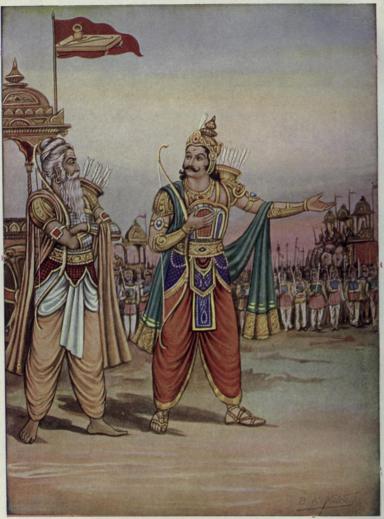“King Duryodhana was born from a portion of Kali, he of evil mind, of evil counsel, dishonour of the Kurus; he who, being a man of dissension, was hated by the whole world.” -Mahabharata1.16.60-81[1]
“The wise man beholds all beings in the Self and the Self in all beings; for that reason he does not hate anyone.” –Isa Upanishad [2]

Duryodhana showing his army to Drona. Image source: Wikimedia
This will be a relatively diffuse postscript to a prior post I made: Playing Duryodhana’s Advocate. Duryodhana is one of the more despised characters in Hindu mythology. This is a shame.
The basic message is this: While Duryodhana is clearly a villain, dismissing him wholly or decrying him as evil incarnate would be to miss the point of the text. The Mahabharata is nuanced, and represents an unresolved tension between on one hand, the counterrevolutionary, materialist, tradition upholding Kshatriya: Duryodhana— and on the other hand, the devotionalist Pandavas, who uphold a newer system of ethics rooted in idealism and theism rather than tradition and pragmatism. Just because modern Hindu discourse is permeated with devotionalism does not mean that always was the case, or always must be the case.
Bhasa’s Depiction of Duryodhana:
Duryodhana may be hated by the world, but at least one respectable writer offered him a charitable representation as a consistent practitioner of Kshatriya Dharma. In Bhasa’s writings, Duryodhana’s virtues, particularly his earthly “master morality” are more pronounced than it is in the epic. Take the following line from the play Duta-Vakya. This is how Duryodhana responds when asked to return part of his kingdom to the Pandavas:
